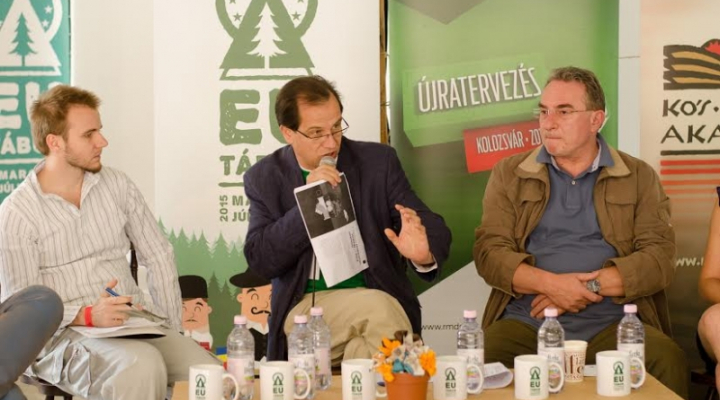RMDSZ MEPs on immigration in Izvorul Mureșului
On the 11th July Iuliu Winkler and Csaba Sógor RMDSZ MEPs held a discussion on the topic of migration at the EU Camp organized at Izvorul Mureșului by the Hungarian Youth Conference (MIÉRT), the Executive Presidency of RMDSZ and the Kós Károly Academy Foundation between the 7th and 12th July for the 12th time this year.
Considering the many crises the EU currently faces, migration and asylum issues seem to pose the greatest challenge facing the EU. When considering the issue of migration, a definite difference must be made between asylum seekers and economic migrants. The latter has always existed in the EU, since migration has always existed, and will continue to exist as long as there will be differences in standards of living and economic development among regions, countries and continents – said Iuliu Winkler.
Csaba Sógor pointed out that at the present we live in an era of migration, as the scale of the migrations of the past 50-60 years is unprecedented in history. The 3.2% of the world's population, 232 million people have departed somewhere in the world, and about 72 million migrants arrived to the EU. Within the migrants of the world the number of political refugees represent around 60 million people, the most tragic issue being that half of the political refugees are children – explained the MEP.
Csaba Sógor mentioned that from a historical point of view Europe also had several periods when Europeans left the continent: between 1846-1939 around 60 million people left for the USA, which represented 10% of the European population’s natural growth. From the II World War until the 1960's half a million people left Europe every year. Between 1960-1973, until the oil crisis Europe has welcomed migrants: in 1971 two million foreign-born workers have already been living in Germany. According to current statistics, 60 million more migrants will come to Europe until 2060. If we do not find a satisfactory solution to deal with this challenge we may witness a large-scale human catastrophe.
Iuliu Winkler also pointed out that the current refugee influx towards Europe is the result of upheavals and civil wars of Northern-African and Middle East countries and the collapse of their public administrations. When we try to deal with this issue, we have to use both our heart and mind. Obviously, we need clear rules and an integrated asylum policy. We must first consider the fact that these people want to save their lives, since they are fleeing from the threat of annihilation of their families in their home countries - emphasized Winkler.
Csaba Sógor also talked about the humanitarian aspects of the EU asylum policy, the difficulties in implementing the Dublin Regulation as well as the failure of Europe in integrating migrants into European societies. If not dealt with properly, the refugee crisis might weaken the European idea itself, said the MEP, in whose opinion Europe needs to act responsibly, considering our failures from the past.











